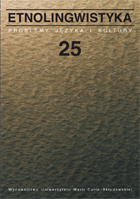Русская честь и польский honor
The Russian ČEST’ and the Polish HONOR
Author(s): Svetlana Michajlovna TolstajaSubject(s): Anthropology, Cognitive linguistics, Philology
Published by: Wydawnictwo Naukowe Uniwersytetu Marii Curie-Sklodowskiej
Keywords: cultural semantics; values; dignity; honour
Summary/Abstract: The author compares the semantics of the Russian čest’ and dostoinstvo with that of the Polish cześć, honor and godność. The Russian čest’ is characterized by two aspects: external (respect for someone, e.g. čest’ i slava geroyam ‘honor and glory to the heroes’) and internal (a high moral value, e.g. čelovek česti, čestnyy čelovek ‘a person of honour’). This semantic differentiation is manifested in synonymous sets, derivatives and phraseological units. The semantic duality of this kind is characteristic of all Slavic languages: it is a continuation of the Proto-Slavic meaning of *čьstь (from the verb čisti/čьsti ‘revere, respect’). The original “actional” meaning developed into the abstract ‘respect, deference’, and then into the more concrete ‘medal, award’. The semantic structure of the concept is analyzed through the actants of the verb čtit’: its subject (who respects?), object (who is respected?), the relation between them, and the reason why a person is respected. Russian derivatives and phraseological units (okazat’ čest’ ‘show respect’, byt’ v česti ‘be respected’ etc.), similarly to other Slavic languages, mainly refer to the external aspect (showing respect towards someone), whereas the internal aspect (the reason why someone is respected) is historically secondary. Prototypically, the subject of čestnyy (adj.) is a person, evaluated mainly through what they do not do: lie, steal, etc. (therefore, truth and justice are important values for the speakers). In Russian, the “external” aspect of čest’ and čestnyy has weakened over the centuries (it is preserved in stereotyped usages) and the “internal”, ethical aspect had gained strength – the latter is already found in the 19th c., in the writings of Pushkin, Lermontov (pogib poèt – nevol’nik česti ‘a poet has died, a slave to čest’’), Lev Tolstoy and in political slogans (čestnye vybory ‘fair elections’). The Polish counterpart of the Russian čest’ is the Latin loan word honor, defined as ‘personal dignity’ (słowo honoru ‘word, promise’, lit. ‘the word of honour’, sprawa honoru ‘a matter of honour’), but the plural honory (czynić honory ‘do the honours’) has an “external” meaning. Old-Polish cześć referred to acts of showing respect, which points to its external dimension. In both languages, there is now a tendency to express the “internal” aspects of the semantics of the Russian čest’ and Polish honor, in accord with the growing interest in human inner life and people’s personality. In both languages, too, there exist lexemes that express the features and behaviour of people in the context of moral values, independent of external judgement: Pol. godność and Russian dostoinstvo.
Journal: Etnolingwistyka. Problemy Języka I Kultury
- Issue Year: 25/2013
- Issue No: 25
- Page Range: 9-21
- Page Count: 13
- Language: Russian

